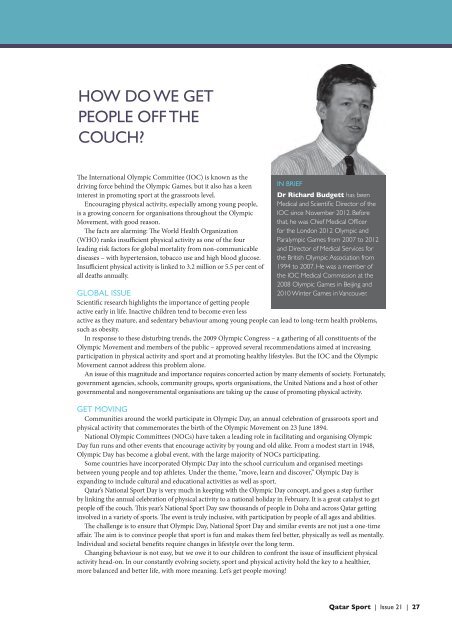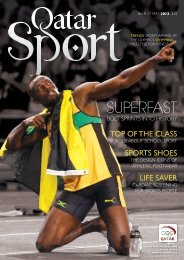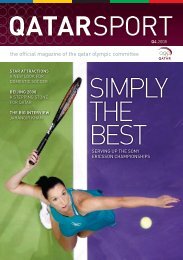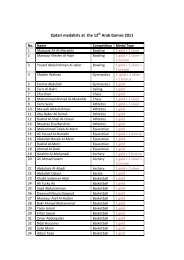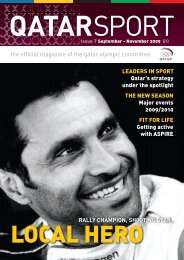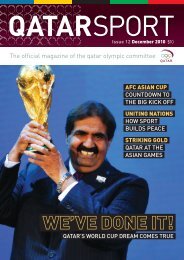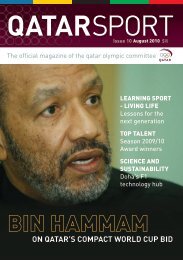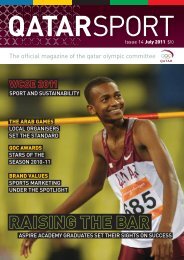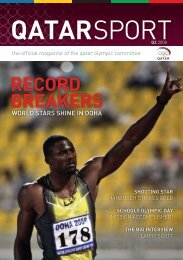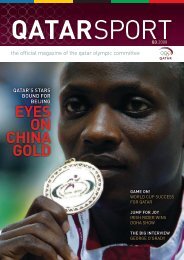Qatar Sport 21_COVER_FINAL.indd - Qatar Olympic Committee
Qatar Sport 21_COVER_FINAL.indd - Qatar Olympic Committee
Qatar Sport 21_COVER_FINAL.indd - Qatar Olympic Committee
Create successful ePaper yourself
Turn your PDF publications into a flip-book with our unique Google optimized e-Paper software.
How do we get<br />
people off the<br />
couch?<br />
The International <strong>Olympic</strong> <strong>Committee</strong> (IOC) is known as the<br />
driving force behind the <strong>Olympic</strong> Games, but it also has a keen<br />
interest in promoting sport at the grassroots level.<br />
Encouraging physical activity, especially among young people,<br />
is a growing concern for organisations throughout the <strong>Olympic</strong><br />
Movement, with good reason.<br />
The facts are alarming: The World Health Organization<br />
(WHO) ranks insufficient physical activity as one of the four<br />
leading risk factors for global mortality from non-communicable<br />
diseases – with hypertension, tobacco use and high blood glucose.<br />
Insufficient physical activity is linked to 3.2 million or 5.5 per cent of<br />
all deaths annually.<br />
global issue<br />
Scientific research highlights the importance of getting people<br />
active early in life. Inactive children tend to become even less<br />
IN BRIEF<br />
Dr Richard Budgett has been<br />
Medical and Scientific Director of the<br />
IOC since November 2012. Before<br />
that, he was Chief Medical Officer<br />
for the London 2012 <strong>Olympic</strong> and<br />
Paralympic Games from 2007 to 2012<br />
and Director of Medical Services for<br />
the British <strong>Olympic</strong> Association from<br />
1994 to 2007. He was a member of<br />
the IOC Medical Commission at the<br />
2008 <strong>Olympic</strong> Games in Beijing and<br />
2010 Winter Games in Vancouver.<br />
active as they mature, and sedentary behaviour among young people can lead to long-term health problems,<br />
such as obesity.<br />
In response to these disturbing trends, the 2009 <strong>Olympic</strong> Congress – a gathering of all constituents of the<br />
<strong>Olympic</strong> Movement and members of the public – approved several recommendations aimed at increasing<br />
participation in physical activity and sport and at promoting healthy lifestyles. But the IOC and the <strong>Olympic</strong><br />
Movement cannot address this problem alone.<br />
An issue of this magnitude and importance requires concerted action by many elements of society. Fortunately,<br />
government agencies, schools, community groups, sports organisations, the United Nations and a host of other<br />
governmental and nongovernmental organisations are taking up the cause of promoting physical activity.<br />
get moving<br />
Communities around the world participate in <strong>Olympic</strong> Day, an annual celebration of grassroots sport and<br />
physical activity that commemorates the birth of the <strong>Olympic</strong> Movement on 23 June 1894.<br />
National <strong>Olympic</strong> <strong>Committee</strong>s (NOCs) have taken a leading role in facilitating and organising <strong>Olympic</strong><br />
Day fun runs and other events that encourage activity by young and old alike. From a modest start in 1948,<br />
<strong>Olympic</strong> Day has become a global event, with the large majority of NOCs participating.<br />
Some countries have incorporated <strong>Olympic</strong> Day into the school curriculum and organised meetings<br />
between young people and top athletes. Under the theme, “move, learn and discover,” <strong>Olympic</strong> Day is<br />
expanding to include cultural and educational activities as well as sport.<br />
<strong>Qatar</strong>’s National <strong>Sport</strong> Day is very much in keeping with the <strong>Olympic</strong> Day concept, and goes a step further<br />
by linking the annual celebration of physical activity to a national holiday in February. It is a great catalyst to get<br />
people off the couch. This year’s National <strong>Sport</strong> Day saw thousands of people in Doha and across <strong>Qatar</strong> getting<br />
involved in a variety of sports. The event is truly inclusive, with participation by people of all ages and abilities.<br />
The challenge is to ensure that <strong>Olympic</strong> Day, National <strong>Sport</strong> Day and similar events are not just a one-time<br />
affair. The aim is to convince people that sport is fun and makes them feel better, physically as well as mentally.<br />
Individual and societal benefits require changes in lifestyle over the long term.<br />
Changing behaviour is not easy, but we owe it to our children to confront the issue of insufficient physical<br />
activity head-on. In our constantly evolving society, sport and physical activity hold the key to a healthier,<br />
more balanced and better life, with more meaning. Let’s get people moving!<br />
<strong>Qatar</strong> <strong>Sport</strong> | Issue <strong>21</strong> | 27


